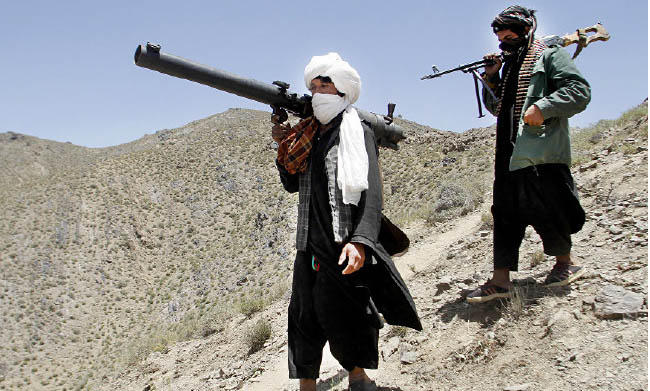The persistent push for talks despite the Taliban’s constant refusal and their large-scale attacks against Afghan nation and National Unity Government (NUG) will not be a well-thought-of mechanism for combating terrorism. The Taliban guerilla fighters have been playing with the life of non-combatants for more than a decade and also slayed high-profile officials including the head of High Peace Council (HPC) Professor Burhanuddin Rabbani and still terrorize people in one way or another. Terrorism jeopardizes the life of every Afghan citizen and it has escalated to the extent that the entire region is exposed to threat. There seems no sign of truce, however.
The national and international conferences have been held with the aim of bringing the Taliban to the negotiating table. For instance, Moscow sponsored a conference last week and offered to host peace talks between the Afghan government and the Taliban. This was the third meeting Russia hosted in four months to push for political negotiations. “The parties had a frank and thorough exchange of views on the current political and military situation in Afghanistan as well as on its prospects and expressed common concern over growing terrorist activities in the country leading to rising tensions and increasing violence which adds to the predicament of the Afghan people,” the Russian foreign ministry statement said.
The US, which dropped the “mother of all bombs” in Nangarhar province of Afghanistan on the eve of Moscow Conference, refused to participate in it. Perhaps, it was in the wake of Russia’s refusal to join the Quadrilateral Coordination Group (QCG) that comprised of Afghanistan, Pakistan, China and the United States and ended with the death of Mullah Omar’s successor with the emergence of mistrust among the members. Subsequently, Russia, China and Pakistan formed a trilateral group over the instability about Afghanistan without giving role to Kabul and Washington. After calling it interference in country’s internal issue, Kabul was also involved in the discussion, but Washington held out against it.
There is still not a common thought or mechanism for combating terrorism in Afghanistan. For example, a non-violent strategy (peace talks) has been underlined in Moscow Conference and the participants said that there was no military solution to the Afghan crisis. Nonetheless, the US dropped the “mother of all bombs” to suggest that military deal would be the right option for counterterrorism. It also reveals the fact that the US President Donald Trump prefers military action to negotiation.
In fact, it seems that the conflict in Afghanistan has come to a stalemate since there is an interminable fluctuation between military action and peace negotiation. In addition to military deal, the US and Afghanistan seek reconciliation process as well if there appears any possibilities. Afghanistan has constantly called warring parties to stop violence and hold negotiation, but only the Hezb-e-Islami Afghanistan (HIA) led by Gulbuddin Hekmatyar responded positively and reached an agreement with the NUG.
Within the last decade, many conferences were held and QCG was established to bring the Taliban to the bargain table, but all were proved abortive. It is believed that Pakistan was the last gleam of hope for Afghan government to nudge the Taliban to reconciliation process as it promised to use its “leverage” in this regard. However, QCG ended with failure and a strong sense of mistrust emerged between Kabul and Islamabad as it resulted in harsh rhetoric. The relation between the two neighboring countries hit rock bottom after the deadly terrorist attack in Sehwan, on February 14, which left heavy casualties behind.
Recently, the US National Security Adviser H.R McMaster have reportedly met with Pakistani Prime Minister Nawaz Sharif and discussed bilateral ties and regional developments. Sharif conveyed Pakistan’s readiness to work with the international community to explore ways in which the Afghan crisis can be resolved. McMaster also met with Pakistani Adviser to the Prime Minister on Foreign Affairs Sartaj Aziz and renewed the commitment of the new administration to work closely with Pakistan in strengthening mutually beneficial relations and towards the shared objectives of peace and stability in Afghanistan and the region. Conveying Pakistan’s concerns over the deteriorating security situation in Afghanistan, Aziz reaffirmed Pakistan’s commitment to work with the international community to support efforts for peace and reconciliation in Afghanistan. He further highlighted the significance of effective border management as part of the actions required to achieve sustainable peace in the region.
The recent meeting reveals that the relation between Islamabad on one side and Kabul and Washington on the other side begins to thaw, but building trust is a highly challenging issue since Pakistan failed to fulfill its promise to nudge the Taliban to peace table.
Now the question is that after futile conferences about peace talks are there any hopes for fruitful negotiation since the Taliban played foul game? The militant fighters continue violence and bloodshed without giving NUG the green light in this regard. I wonder why the world spend time and energy on such conferences rather than targeting the terrorist hideouts and rooting out the hotbed of their radical ideology, wherever they are.

